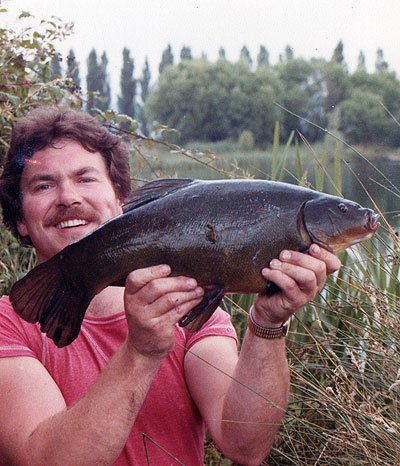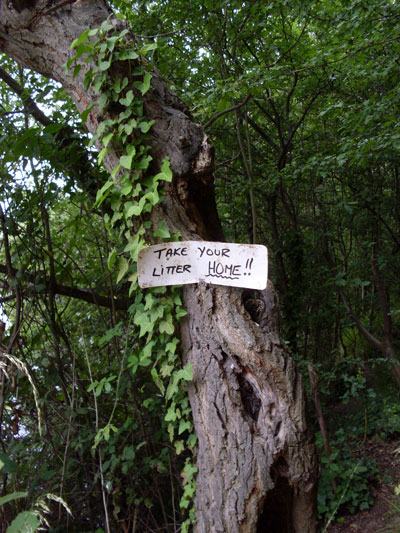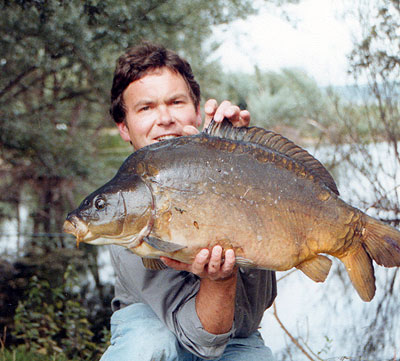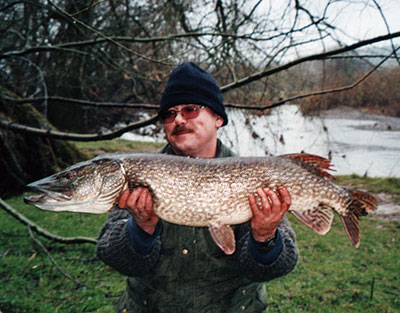I have recently embarked on a voyage of discovery, but I am sure that the journey will be brief and that, on docking, I shall return to the bosom of what I know; to the familiarity of those ponds and streams and rivers which keep their heads down and silently get on with it.
It was 1991 when I unconsciously dumped the litter-strewn banks of the otherwise wonderful Johnson’s Lakes in Kent in favour of less hazardous venues; quieter waters where there existed little chance of an altercation with a member of the underclass. Yes, you read that right. Anybody prepared to impose their presence on one of Nature’s delights; to be gifted with crystal-pure water and proffered immaculate tench of unprecedented size has an obligation to leave that patch of Paradise in the best possible condition. Astonishingly, the great majority at Johnson’s possessed zero understanding of this basic tenet of water-lore, so it was left to me – not the likes of me, you understand – ME – to tackle these numb-skulls and to risk life and limb in so doing. The culprits, then, were very much deserving of my relatively compassionate description.

|
“A beautiful Johnson’s tench, circa ’84” |
On the undiscovered Upper Chelmer I fished for many years in welcome solitude, stalking its banks with only what was necessary to catch, weigh and photograph a fish; dress was drab, and my approach low and cautious. In this way – and before the thoughtless new owner of the house at Croxton Mill emptied the river to shore-up her garden – I enjoyed ten ecstatic years bending into wild, wild, cane-straining chub; carp that rocketed unstoppably through dark overhangs of chestnut; pristine roach to 2lb 7oz and even pike to double figures unable to resist the lure of a struggling chavender. At the mill pool I’d squat within the nettles, fingers brushing cork, distracted by yellow grey wagtails, kingfishers, and black redstarts in search of hidey-holes in the red brick. Further down, I’d kneel in the tall grass, straining my neck to follow the progress of my free-lined crust, making sure of its unhindered passage to the shaded eddy beneath the alder. At Mill Green, heavier tackle was employed to present giant lumps of flake to large mirrors loafing in the lilies, and when they took, the very meaning of life would come surging up the rod and into my very being: whatever the soul might be, you can’t be a fisherman without one. Sex? Yeah…but let’s just have one more cast, eh?

|
“…not the likes of me, you understand “ |
In the Wye Valley I found my spiritual home, warm and content within blankets of gold and green; at ease with rock and white water; at one with buzzard, merganser, peregrine, the owls of darkness – and even the canoeist: his passage (if you’ll excuse the expression) is brief, silent, clean and no more disturbing to fish than a seaward log. At night, I’d hold the rod and feel for bites, perfecting the art of restraint with every pluck and vibration that told of life below, but when the line pulled taut for a second or two I’d strike into the mystery and soon have a pristine, wild, water-creature called a chub – or a barbel – lying before me on the damp grass.
On a quiet stretch of the Ouse I’d fish exclusively for barbel. How ‘my’ bit of river had remained undisturbed and un-fished for so long is truly a puzzle, for ‘civilization’ was close-by and access simplicity itself. Nonetheless, the very clichéd ‘Barbel Bush’ produced for me a dozen perfect specimens to almost twelve pounds and would – I know for sure – have given up more and heavier fish had I not drawn-off when word got out. Like barbel everywhere, these fish were fitted with rocket-packs, determined to claim the rod for themselves and responsible for near-stopping my heart on many occasions; indeed, one morning bright and clear I nodded-off and had my James Avon wrenched into the river…how I’d love to have been the passer-by who saw me leap directly from the cosy, fluffy Land of Nod and into nine feet of Bedfordshire’s finest. But here’s the thing: each and EVERY one of those captures over that summer would have had the rod in had I not been attentive and ready for action.

|
“A solid, float-caught Johnson’s ’22” |
O.K…so these fish more or less hooked themselves: that’s what barbel do, but all of those other wonderful captures from the Chelmer, the Wye, the Thames and lots of other little brooks and ponds would not have been made without the angler – in this case, me – being on the ball and using his skill and judgment to decide when to strike the hook home. Timing and making good the strike IS the very essence of our sport; it is the highest point, perhaps, of the experience we call ‘angling’, not to be surpassed by the fight, the weigh-in, the photograph or the many tales recounted thereafter. The successful hooking of a fish and the arcing of the rod following minutes of float-dithering or bobbin-twitching, rod-watching or line-feeling, IS the climax to all of that expensive, time-consuming, patient foreplay we put ourselves through in order to make us happy: do footballers rejoice quite so enthusiastically with an in-off the ‘scorer’s’ backside? Do boxing fans cheer quite so loudly with a points-decision – rather than a knock-out? Snooker players occasionally own-up to undetected fouls rather than kid themselves and cheat their opponent. They are gentlemen.

|
“A Wye 20” |
So, I am currently aboard The Revelation after nearly twenty years creeping about in the undergrowth. I have joined a club. I joined with the specific view of catching a double-figure tench and have, so far, managed two at nine pounds, an eight-pounder and various other fish that would have won me a prize rod not so long ago. Those of us who target the tincas are in the minority, most members determinedly sitting it out for ‘Old One Eye’ or whatever its name is. The method will be known to all here: position hair-rigged, tethered boilie within a carpet of similar offerings, tighten-up, check radio-transmitter, go to sleep. When carp hooks itself, pick up rod and reel it in – subject to the fish’s fighting ability of course. In bank-side discussion with a very good pal of mine I mentioned the frustration of mis-timed strikes and added – like you do -‘y’know what I mean?’ He replied ‘Well, no, I don’t. I just lift my rod and it’s on’. The same would be said by any number of people in pursuit of carp around the country, and I’m sure at this point that I need say no more! But I shall.
What’s going on here is ‘trapping’, isn’t it. It’s setting a snare and waiting (and waiting and waiting) for a fish to snag itself, a ‘Trap for birds and animals’ as the Collins English Dictionary would put it. However, I am aware of, and conversant with the opposing, highly semantic arguments and admit to a degree (a very small degree) of frailty in my contention. So I pose a simple question – especially to the very nice chap I spoke to last week who drew close, fascinated as a neurology student, as I put my hook into a knob of paste: what’s the ‘high-point’ for you?
Cliff Hatton.
| Read Cliff Hatton’s books from Medlar Press |
|
Not only is Cliff Hatton a great writer for FishingMagic and other journals, he is also a highly tallented cartoonist and has a number of books published by Medlar Press. They include: All Beer and Boilies, All Wind and Water, and soon to be published – All Fluff and Waders. Visit the Medlar Press site by clicking here and order your copies now! |














